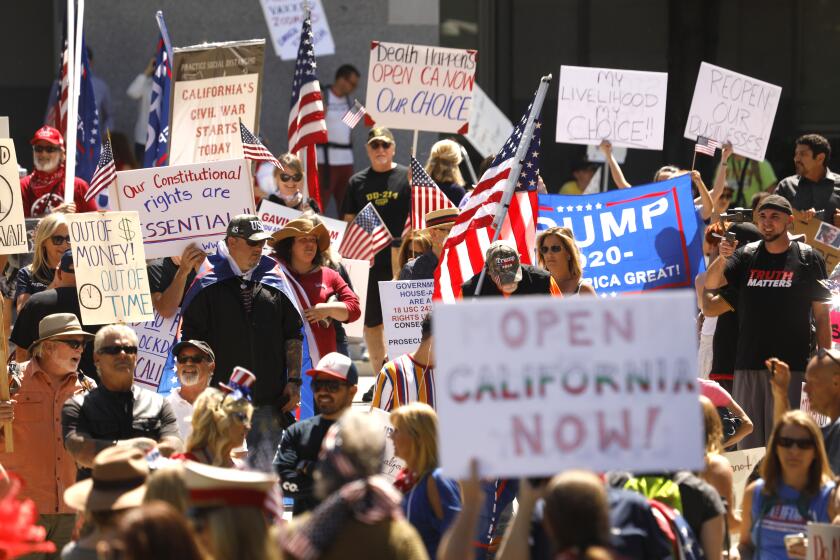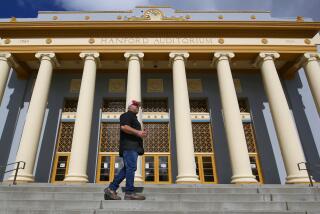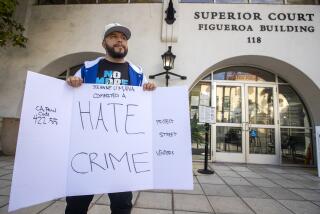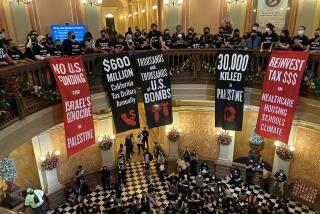Role of extremist groups at California lockdown protests raises alarms
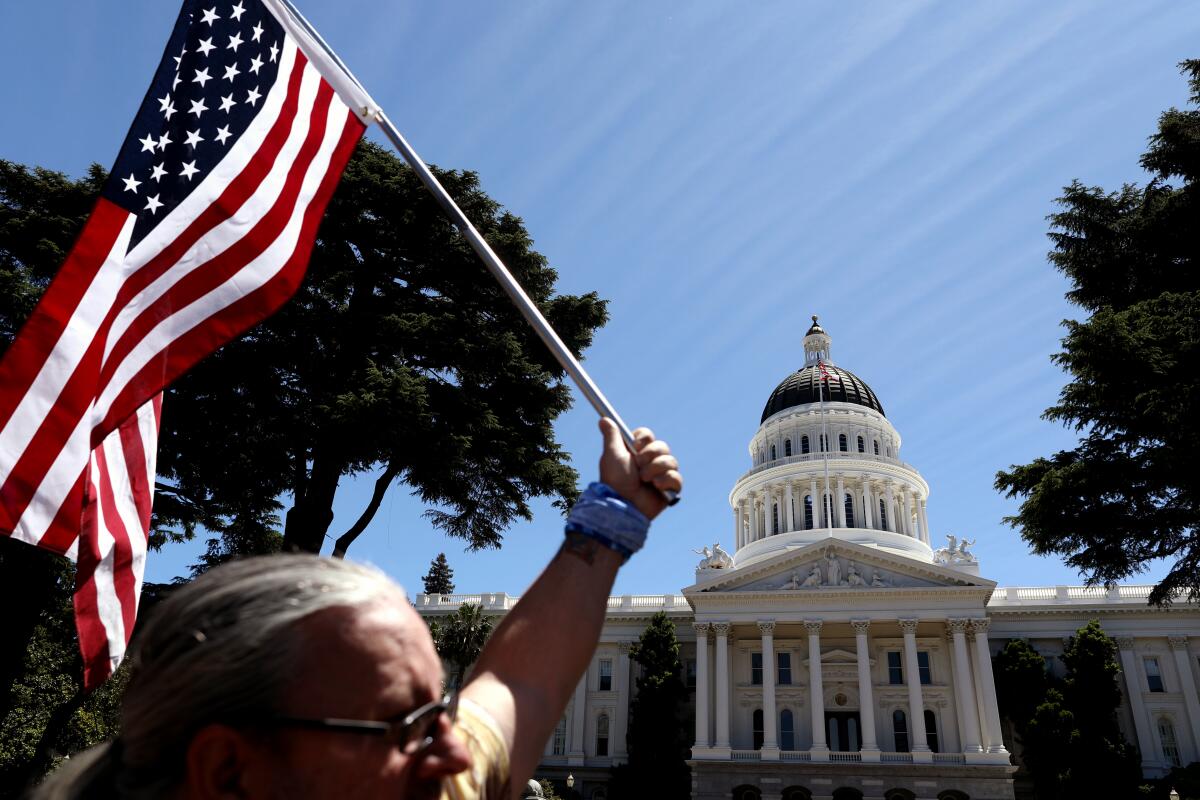
On Saturday afternoon, Pastor John DeBow watched with pride as his daughter defied social distancing edicts at the state Capitol by giving free haircuts to some of the people from across California who had gathered again to protest remaining restrictions aimed at curbing the spread of coronavirus.
He was unaware that, a few yards away, a contingent of Proud Boys, an alt-right organization, had set up a tent attached to the stage. Some members were walking through the crowd in camouflage tactical vests and their trademark black-and-yellow Fred Perry polo shirts.
But the Napa religious leader, who has taken to online preaching and plans to continue to honor the state’s ban on in-person church services, said he was unbothered by their presence, though they have been deemed an extremist group.
“You are always going to have some radical people in any group whatsoever,” DeBow said. “But because you have a few crazies, you don’t have to get rid of the whole barrel of apples.”
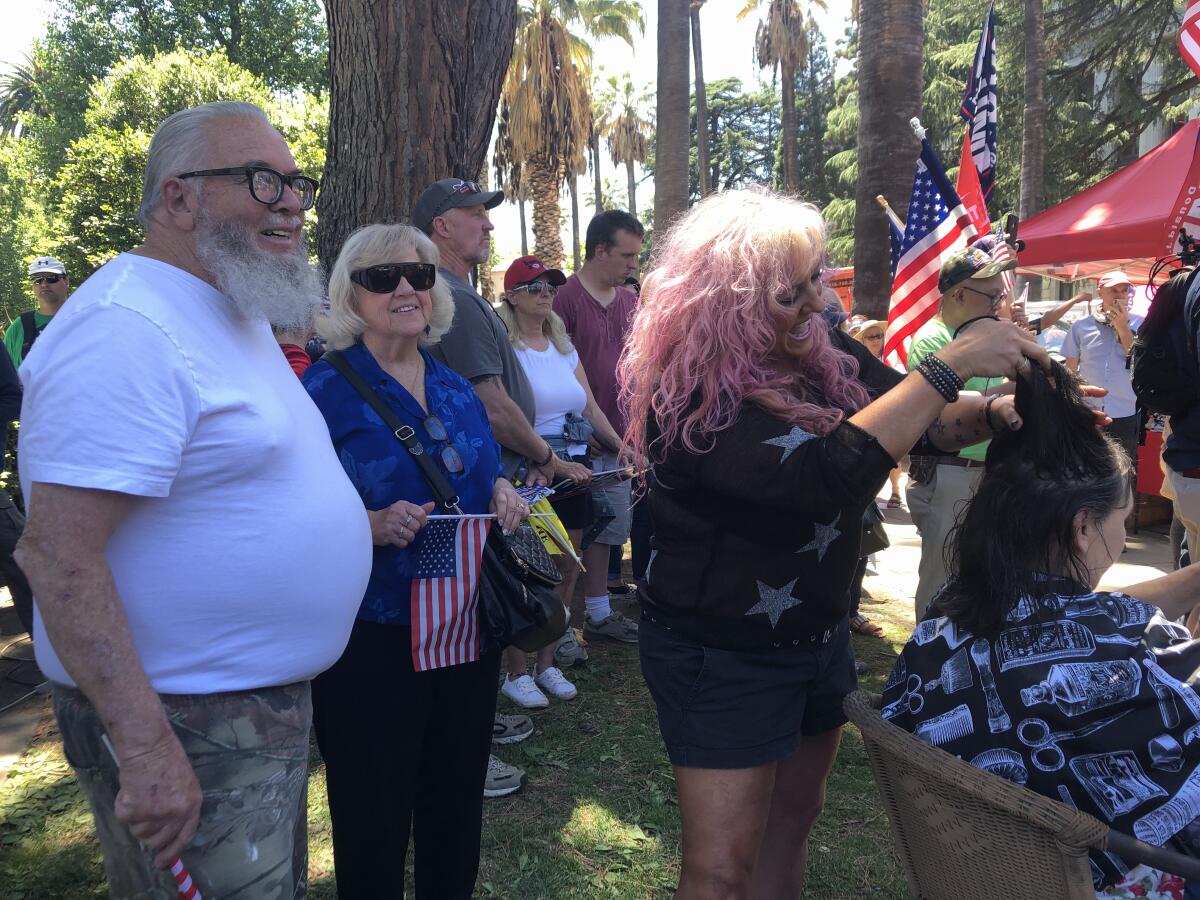
In California and across the country, lockdown protests have drawn a melting pot of participants, including peaceful activists such as the DeBows and militias such as the Boogaloo Boys, who have credos that call for civil war, said Brian Levin, professor of criminal justice and director of the Center for the Study of Hate and Extremism at Cal State San Bernardino.
It’s unclear how large a role extremist groups are playing in protests. The demonstrations have drawn people with a wide array of concerns, including those who feel it’s wrong for the stay-at-home orders to cover religious institutions and libertarians who fear the rules are destroying the economy. At many events, there have been numerous signs supporting President Trump. Some people who oppose vaccines have also taken up the cause.
Coronavirus pandemic widens racial and political divisions
It’s uncertain to what extent extremist groups are trying to recruit at the events. Saturday’s Sacramento gathering, estimated by city police to be the largest yet, with 2,000 in attendance, resembled a family carnival, with an organic-gelato vendor, and music performances sprinkled among political speeches.
Still, Levin said he found the intermingling of hate groups with others to be concerning.
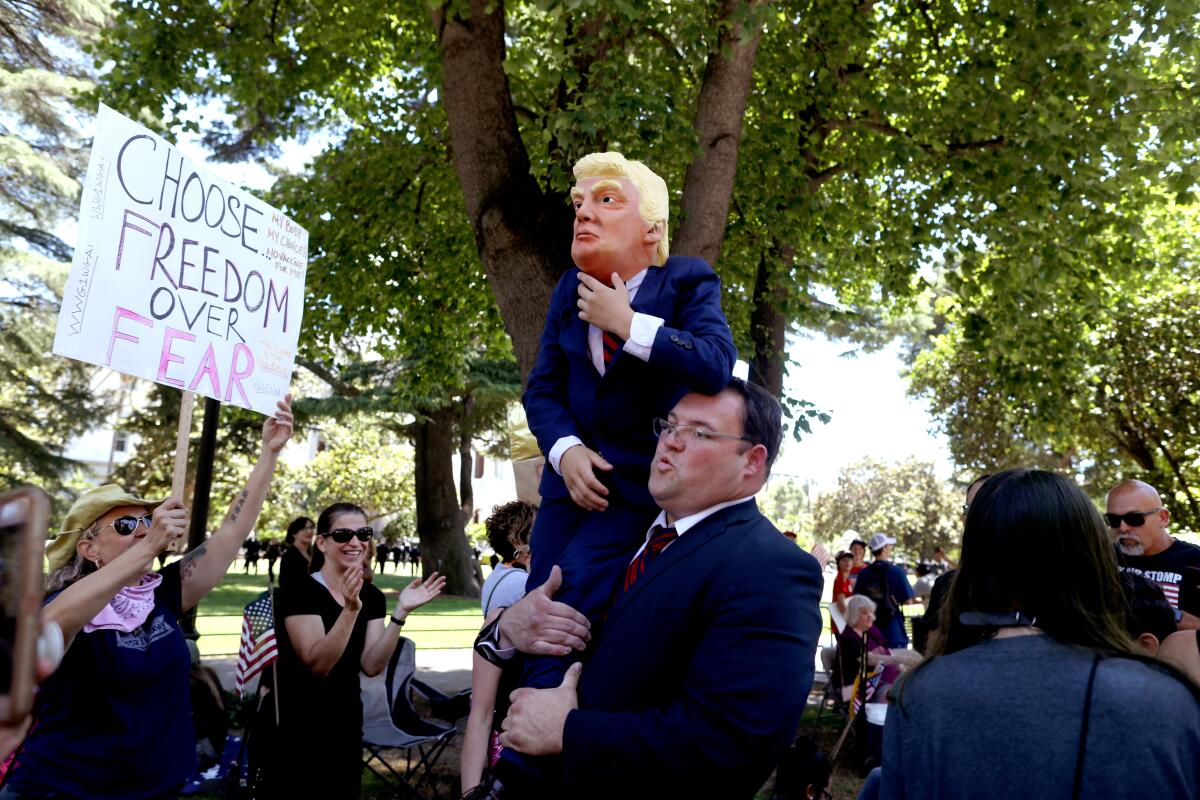
“Different people are showing up with different goals, but when they collect together, they influence each other,” he said, creating a “petri dish for conspiracy theories and bad information, as well as aggressiveness.”
That mishmash, Levin said, could make make the events a “recruiting rabbit hole” for groups that struggle to find inroads with mainstream audiences.
Devin Burghart, a researcher with the nonprofit Institute for Research and Education on Human Rights, has been monitoring reopening groups online and says he sees extremism and conspiracy theories gaining traction in thousands of internet postings that have sprung up in recent weeks.
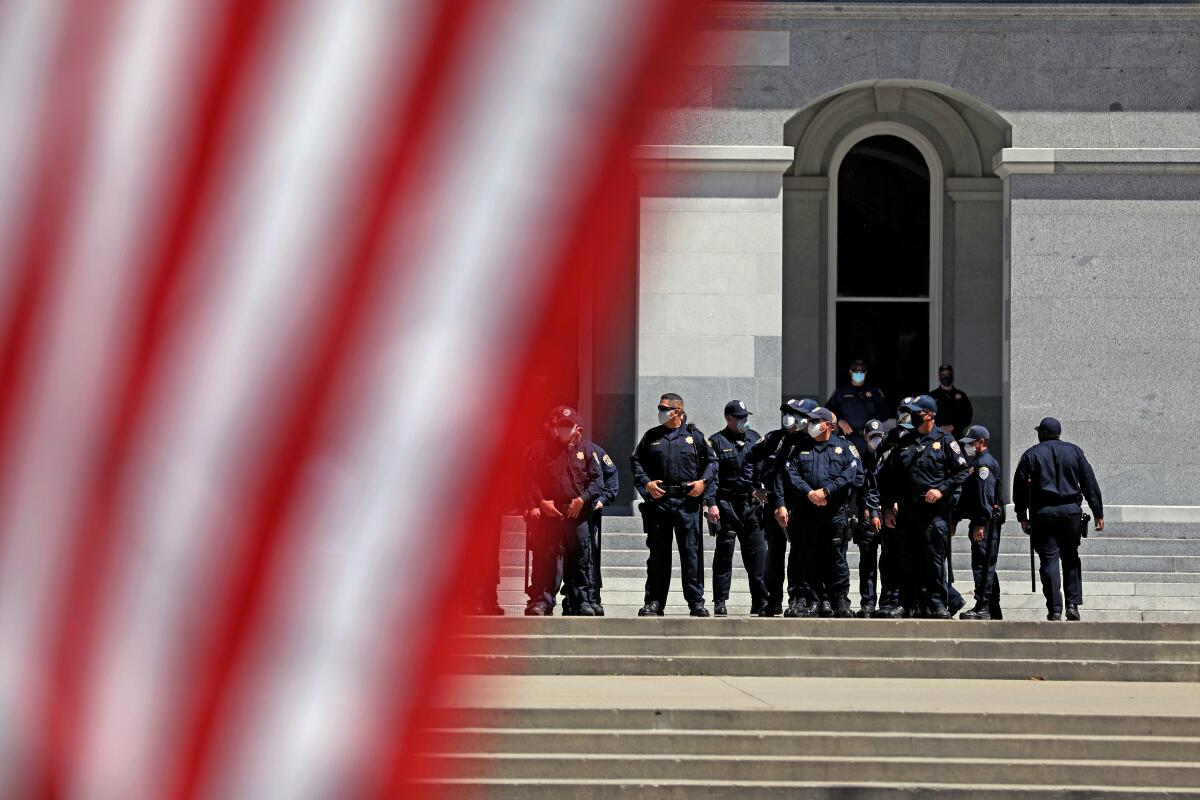
“These groups, while initially established around reopening, are pivoting to a larger, far-right political project,” Burghart said.
He said the number of people joining such groups and the speed with which they had grown was “unprecedented” in American social movements. In California, he has found more than 70 such Facebook groups with about 300,000 members, and more than 2 million participants nationwide.
Maria Tchijov of women’s rights organization UltraViolet said her group believed social media presence was “an engine” for on-the-ground action, including a growing push to defy mask requirements — which has emerged as a cultural flashpoint of political affiliation.
UltraViolet staged a counterprotest last week at the Michigan Capitol in Lansing, driving a billboard truck around the building with a sign that criticized Facebook for what the group said was a failure to regulate false information in group forums on reopening, including posts that discount the severity of the coronavirus.
Facebook, which did not immediately return a request for comment, has in recent weeks removed some postings.
Burghart said he had already seen a shift in talking points that he thought would move the focus of some groups from lockdowns to the upcoming election, and said many of those now online had both money and experience in organizing.
“You can see a continuing growth of that,” he said, “even as the governor has decided to relax some restrictions around the state. Those numbers are continuing to go up.”
Burghart said that, in the online forums, he had tracked a resurgence of closer-to-mainstream political activist groups such as the Tea Party movement, along with militias and conspiracy theorists such as QAnon and some anti-vaccine activists.
Conspiracy theories about the virus are rampant in reopen forums and at rallies. Those that have gained traction include the belief that a coronavirus vaccine will carry a microchip that allows the government to track citizens, or that the virus is a political hoax perpetrated by the Democratic Party to promote voter fraud with mail-in ballots.
On Saturday, a young boy waiting in line for a shaved ice at the rally explained to a fellow protester that the virus was less deadly than the flu, while a few feet away, a group of men tried to convince a female passerby that California’s rural counties needed to secede to end the exploitation of workers. Nearby, a sign on a pole advertised an upcoming event with Judy Mikovits, the virologist featured in a widely debunked documentary on the novel coronavirus, and protesters waved signs warning of threats posed by Microsoft Corp. co-founder Bill Gates and gun control advocates.
The spread of such views, Levin said, has already led to some extreme reactions.
Levin pointed to armed protesters in Michigan and elsewhere, and the recent arrest of a Colorado protester for having a pipe bomb. In Fresno, shutdown protesters followed a City Council member home, leading to a scuffle that ended with misdemeanor charges against the politician.
Levin and Burghart said they believed there would be more such incidents. Hate crimes have increased since the pandemic began, Levin said.
“You see these different political strains gaining steam and also gaining new followers,” Burghart said. “I worry about acts of violence.”
Levin said that as the “initial grievance” of the stay-at-home order faded from view, he expected the groups to grow online and on the ground and to refocus on new shared concerns. Levin said many groups shared strong support of Trump, and the president’s backing of the notion of personal freedom amid the pandemic has resonated with them.
“Shortly after the president talked about liberating various states,” Levin said, “that’s when we saw this really take off, and we went from seeing a few dozens to hundreds of these nationally.”
Burghart said that although many of the rallies began as grassroots movements, they had quickly been overtaken by groups with funding and organizing savvy and were transitioning from the single issue of lockdowns to broader political causes.
Multiple candidates for state and national office spoke at the Sacramento event on Saturday, appealing to potential voters to curb what they see as too much government intervention.
Tim Thompson, a pastor who has been active in shutdown protests, said last week he remained unhappy with the current situation in California, even though Riverside County, where his church is located, had rescinded most rules. His church is holding in-person services.
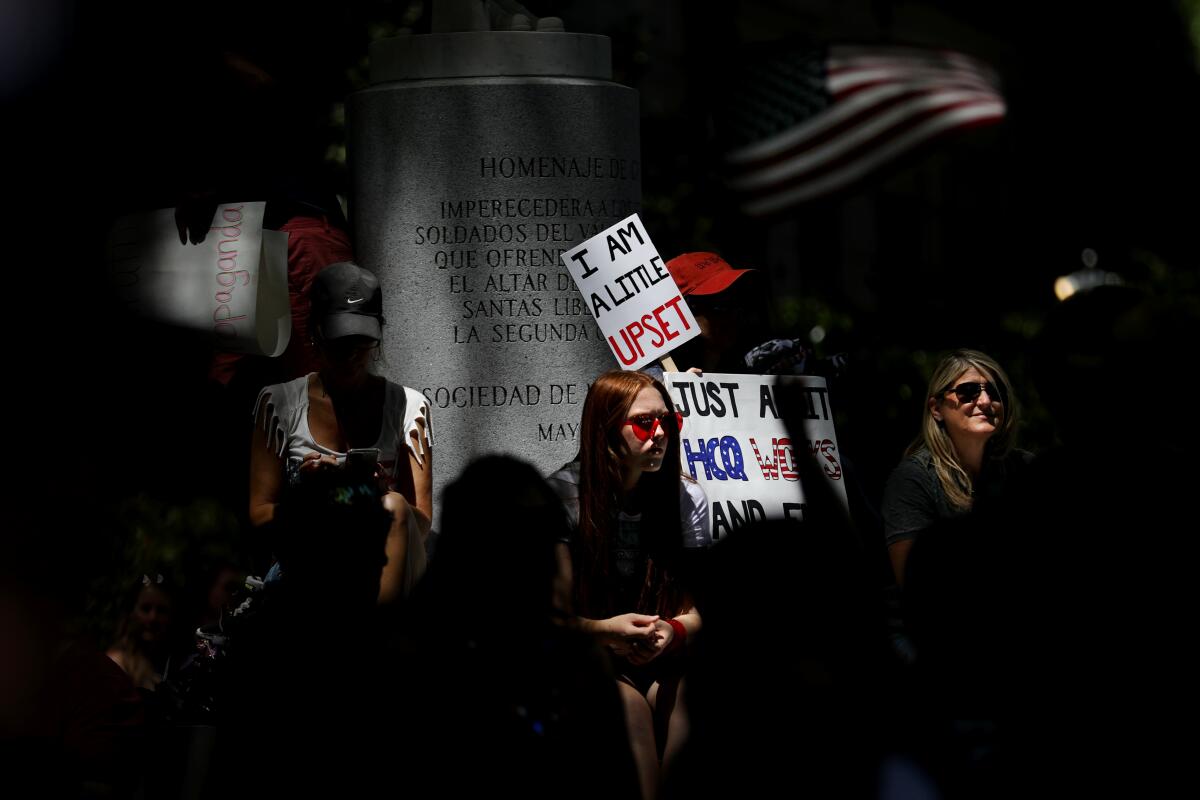
“It amazes me how many people are so quick to let the government have so much authority over us,” Thompson said. “I think we continue to see a massive government overreach, specifically with the church, but in general.”
He believes the shutdown protestation “shouldn’t be associated with the alt-right; it should be associated with freedom.”
DeBow agrees. Though he noted that he was at risk for the coronavirus due to health conditions — he is currently on chemotherapy and describes himself as overweight — he thinks the shutdowns are unwarranted and create more harm than they prevent. He said his community had seen at least two suicides that he believed were related to restrictions.
“I can tell you these people have a lot of heart,” he said, gesturing at the crowd. “It’s our conviction that the cure is worse than the disease.”
More to Read
Start your day right
Sign up for Essential California for news, features and recommendations from the L.A. Times and beyond in your inbox six days a week.
You may occasionally receive promotional content from the Los Angeles Times.
